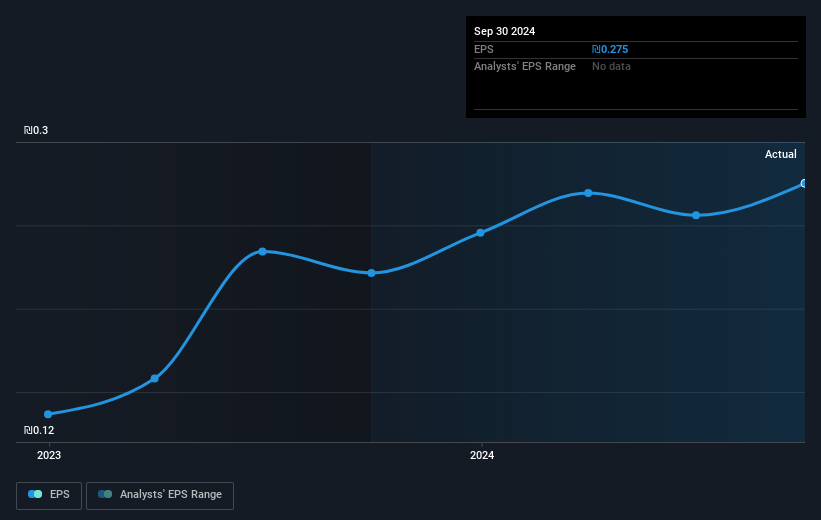- Israel
- /
- Paper and Forestry Products
- /
- TASE:SHAN
Shaniv Paper Industry's (TLV:SHAN) earnings growth rate lags the 33% return delivered to shareholders

It might be of some concern to shareholders to see the Shaniv Paper Industry Ltd (TLV:SHAN) share price down 13% in the last month. But over the last year the share price action has been satisfactory. We say this because the stock (which is up 27%) actually surpassed the market return of (26%).
While this past week has detracted from the company's one-year return, let's look at the recent trends of the underlying business and see if the gains have been in alignment.
In his essay The Superinvestors of Graham-and-Doddsville Warren Buffett described how share prices do not always rationally reflect the value of a business. One flawed but reasonable way to assess how sentiment around a company has changed is to compare the earnings per share (EPS) with the share price.
During the last year Shaniv Paper Industry grew its earnings per share (EPS) by 24%. This EPS growth is reasonably close to the 27% increase in the share price. So this implies that investor expectations of the company have remained pretty steady. It looks like the share price is responding to the EPS.
The image below shows how EPS has tracked over time (if you click on the image you can see greater detail).

This free interactive report on Shaniv Paper Industry's earnings, revenue and cash flow is a great place to start, if you want to investigate the stock further.
What About Dividends?
When looking at investment returns, it is important to consider the difference between total shareholder return (TSR) and share price return. Whereas the share price return only reflects the change in the share price, the TSR includes the value of dividends (assuming they were reinvested) and the benefit of any discounted capital raising or spin-off. Arguably, the TSR gives a more comprehensive picture of the return generated by a stock. As it happens, Shaniv Paper Industry's TSR for the last 1 year was 33%, which exceeds the share price return mentioned earlier. The dividends paid by the company have thusly boosted the total shareholder return.
A Different Perspective
It's nice to see that Shaniv Paper Industry shareholders have received a total shareholder return of 33% over the last year. And that does include the dividend. Since the one-year TSR is better than the five-year TSR (the latter coming in at 2% per year), it would seem that the stock's performance has improved in recent times. Someone with an optimistic perspective could view the recent improvement in TSR as indicating that the business itself is getting better with time. While it is well worth considering the different impacts that market conditions can have on the share price, there are other factors that are even more important. Case in point: We've spotted 4 warning signs for Shaniv Paper Industry you should be aware of, and 2 of them can't be ignored.
If you would prefer to check out another company -- one with potentially superior financials -- then do not miss this free list of companies that have proven they can grow earnings.
Please note, the market returns quoted in this article reflect the market weighted average returns of stocks that currently trade on Israeli exchanges.
New: Manage All Your Stock Portfolios in One Place
We've created the ultimate portfolio companion for stock investors, and it's free.
• Connect an unlimited number of Portfolios and see your total in one currency
• Be alerted to new Warning Signs or Risks via email or mobile
• Track the Fair Value of your stocks
Have feedback on this article? Concerned about the content? Get in touch with us directly. Alternatively, email editorial-team (at) simplywallst.com.
This article by Simply Wall St is general in nature. We provide commentary based on historical data and analyst forecasts only using an unbiased methodology and our articles are not intended to be financial advice. It does not constitute a recommendation to buy or sell any stock, and does not take account of your objectives, or your financial situation. We aim to bring you long-term focused analysis driven by fundamental data. Note that our analysis may not factor in the latest price-sensitive company announcements or qualitative material. Simply Wall St has no position in any stocks mentioned.
About TASE:SHAN
Shaniv Paper Industry
Engages in the production and marketing of paper, cleaning, automotive, and personal care products in Israel and internationally.
Proven track record slight.
Similar Companies
Market Insights
Community Narratives



